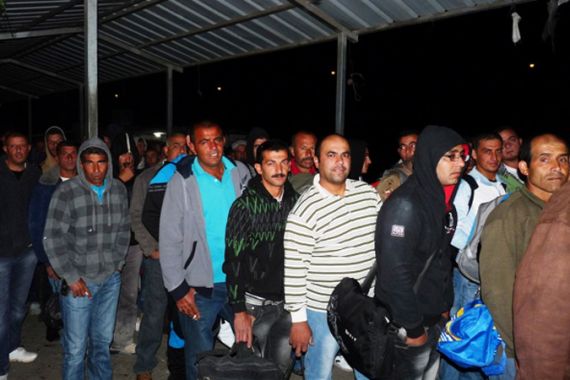Palestinians risking their lives for a job
West Bankers trying to find work in Israel face prison, injury, and even death.

Every week, Muhammad Ibrahim Hantash puts his life at risk in order to find a day’s work. The 23-year-old from Khursa, a village in the West Bank about 15 kilometres south of Hebron, often crosses illegally into Israel in search of a job to sustain his family.
Because Hantash is unmarried, he is not eligible to obtain a work permit from the Israeli Civil Administration, the government department responsible for entry into Israel. Israeli security agencies believe that married Palestinian workers, especially those with children, are less likely to be involved in “acts of terror” inside Israel.
Unlawful border crossings into Israel are rife with peril, and often end in injury or even death. “Ours is a piece of bread soaked in blood,” said Hantash. “You leave your family shortly before dawn, but you never know for sure if you will return home at the end of the day. Nothing is certain and we live in a constant state of anxiety.”
|
|
| Palestinian struggle to reclaim village |
He is just one of thousands of young Palestinians who endanger their lives in order to find work, helping them and their families withstand the bleak economic situation in the occupied Palestinian territories. As many as 70,000 Palestinians are thought to commute each day between the West Bank and Israel. According to the Palestinian Labour Ministry, between 35-40 percent of them are unlicensed workers.
Israeli authorities insist that the Palestinian Authority, not Israel, is responsible for providing jobs for Palestinians in the West Bank. But the PA has no sovereignty of its own, and no control over border crossings with Israel or the outside world.
The PA’s Labour Ministry does not have exact figures on how many unlicensed Palestinian workers have been shot by the Israeli army and border police as they attempt to enter Israel.
According to the Palestinian Labour Ministry’s Manpower Department, between five to ten workers lose their lives this way every year. Dozens of others are injured, some seriously, when the vehicles they travel in crash while trying to elude Israeli army jeeps.
This January, Uday Kamel Darawish, from the town of Dura, was shot dead by Israeli soldiers as he tried to enter through a small gap in the border barrier near the town of Dahirriya. Relatives said Darawish was shot in the chest with “dum-dum bullets” – ammunition designed to expand on impact in order to produce a wound of larger diameter. Fellow workers reportedly tried to save his life, but as they approached his body, Israeli soliders fired at them.
On October 21, eight Palestinian workers – also from Dura – were injured when an Israeli army vehicle rammed their car. Two days earlier, two other workers were seriously injured near Jerusalem after they fell into a pit during a chase.
Yousef Suleiman, 38, is an unlicensed Palestinian worker who says he has “been through it all”.
“Israel treats Palestinian workers as pieces of trash,” he said. “When they catch us, they beat us severely. Beating unlicensed workers is against the Israeli law. However, for the Israeli justice system, entering Israel illegally nullifies any complaints of mistreatment at the hands of the police or soldiers.”
When they catch us, they beat us severely. Beating unlicensed workers is against the Israeli law. However, for the Israeli justice system, entering Israel illegally nullifies any complaints of mistreatment at the hands of the police or soldiers.
“They often tell us: ‘Go to Abbas to feed you and cater for your families,'” he continued, referring to PA Chairman Mahmoud Abbas. “We retort that Abbas himself and his authority are under the Israeli occupation. But, of course, the logic of power – not the power of logic – is what prevails at the end.”
According to Suleiman, caught workers are taken to an Israeli police station where they are forced to sign documents that allow the Israeli authorities to indict them if they enter Israel again without a valid entry permit. The document is reportedly only written in Hebrew, and very few workers understand what their signatures entail. Before the workers are released, they are given a suspended prison sentence from six months to three years if they are caught again in Israel.
Despite the security risk, Palestinian workers are often preferred over foreign workers, said Suleiman. He said they are more skilled, work harder and don’t cost the Israeli employer additional expenses such as airline tickets, housing arrangements and medical insurance. “Besides,” he said, “the Palestinian workers get their work done and return to their homes in the West Bank at the end of the day.”
The Israeli Civil Administration in Hebron did not respond to multiple requests for comment about the issue of unlicensed Palestinian workers in Israel.
However, Egal Palmor, a spokesman for the Israeli Foreign Ministry, said Palestinian workers trying to enter Israel illegally were “infiltrators very much like foreign workers from Africa reaching Israel via the Egyptian borders”.
Palmor said Palestinians were able to enter Israel to work because Israel’s separation wall with the West Bank is not yet complete. “The barrier was not built to prevent Palestinian workers from entering Israel for work,” he emphasised. “It was built to prevent terrorist infiltration.” He also denied that Israeli soldiers were given instructions to shoot workers.
When asked whether a long-term solution to the problem exists, Palmor said only creating more jobs in the West Bank would significantly decrease the number of Palestinians seeking work in Israel.